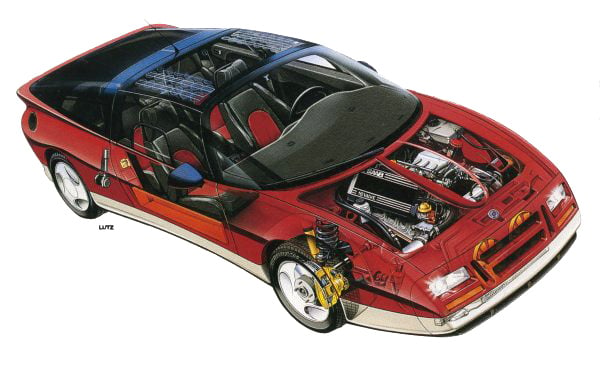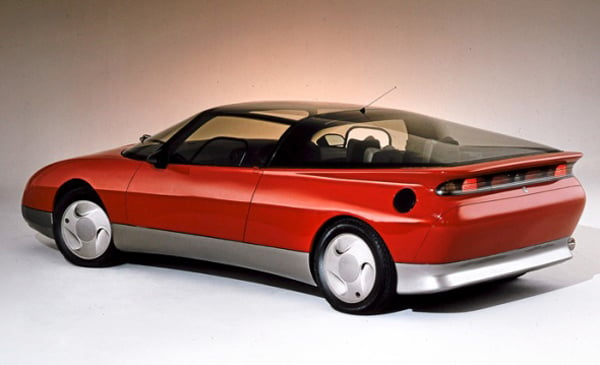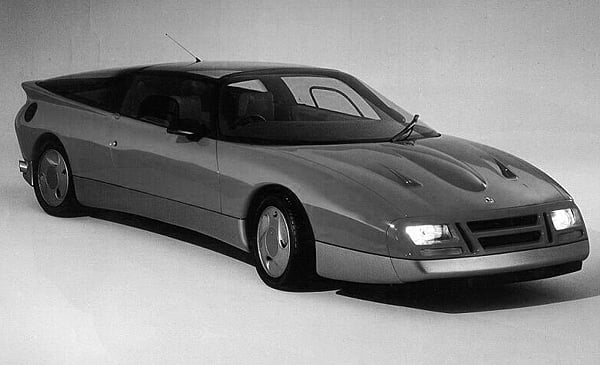In 1985, Saab had the world at its feet: the 900 was popular with doctors, pharmacists and architects – while the 9000’s life had just begun, its sights set firmly on the acclaimed BMW 5 Series. Then, contrary to expectations, Saab unveiled a revolutionary design study. It was based on the underpinnings of the proven 900 Turbo, but was blessed with a sleek body and the designation ‘EV-1’ – standing for ‘Experimental Vehicle’, rather than today’s more usual meaning (electric vehicle).
Not since the company’s early years had there been a Swede so svelte – the design being an artifact from the pen of in-house designer Björn Envall, who incidentally fabricated the first clay model of the EV-1 on his kitchen table. The profile of the prototype garnered much attention at its launch at the 1985 Frankfurt Motor Show but it may have reaped more had it been known that, functionally, it was to be the last ‘true’ Saab. EV-1 was produced as a fully working car but had some interesting innovations: extremities were constructed of bump-resistant Kevlar-aramid composite, while the glassfibre doors had carbonfibre inserts nestled inside, acting as lightweight side-impact protection beams.


The EV-1’s modernity continued above its waistline: the roof was made entirely of bronze-tinted, heat-resistant glass embedded with solar cells – the latter of which powered an interior cooling fan, a concept revisited by the latest Audi A8. Only the narrow A-pillar and less-narrow, chassis-reinforcing targa bar thwarted a panoramic view of the outside world, though their blackened state gave the car a futuristic appearance. A host of other electrical innovations were present, including a speedometer which only lit the digits showing the current speed; a feature used in later production Saabs.
The mechanicals, however, were proven. Following Saab tradition, the 282bhp was sent to the front wheels, originating from an inline, turbocharged 1985cc. A speed ceiling of 168mph – combined with the respectable 5.9-second 0-62mph sprint time – put EV-1 in the same performance league as a Ferrari Testarossa, an impressive achievement for a car with a third of the cylinders and a considerable displacement handicap. But then that was Saab in its prime: an innovative, forward-thinking company that challenged current assumptions.

Despite this, Saab never found a case for a production version of the EV-1, meaning it remained merely the subject of glossy magazine pages and trade show floors. But while the fate of its creator is sealed, the EV-1 prototype is still open to resolution: it will be auctioned off as part of the liquidation of the Saab Heritage Museum inventory.
Classic Concepts series
No. 1: 1969 Holden Hurricane
No. 2: 1976 Ferrari Rainbow by Bertone
No. 3: 1980 Aston Martin Bulldog
No. 4: 1959 Chevrolet Corvette Stingray
No. 5: 1976 Maserati Medici II
No. 6: 1952 Alfa Romeo C52 Disco Volante
No. 7: 1967 Lamborghini Marzal
No. 8: 1971 Matra Laser by Michelotti
No. 9: 1993 Aston Martin Lagonda Vignale
No. 10: 1968 Alfa Romeo Carabo
No. 11: 1981 Mercedes-Benz Auto 2000
Photos: Saab






